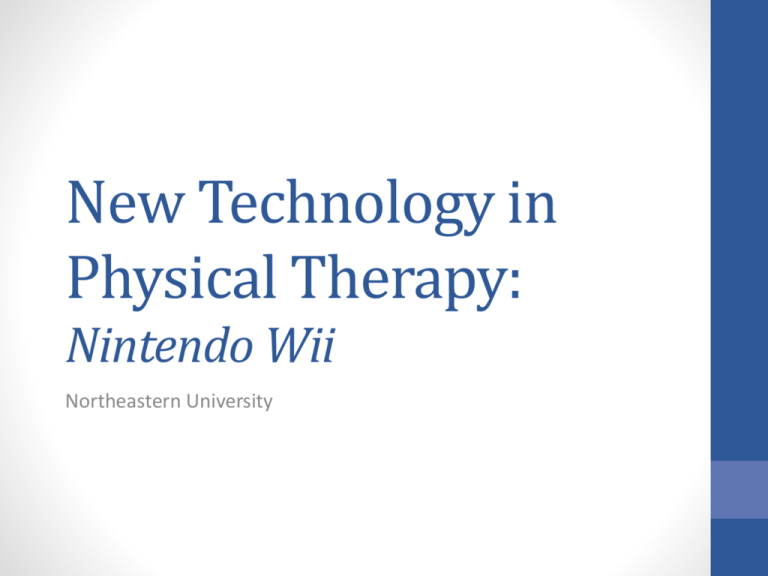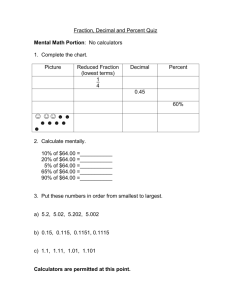File
advertisement

New Technology in Physical Therapy: Nintendo Wii Northeastern University Overview • • • • • • • • • • Introduction Treatment Objectives Physical, occupational, neurological rehab Which health care professionals use WiiFit? Which patients use WiiFit? Wii Golf Wii Balance Board Arthritis Total Knee Replacement Case Study How is WiiFit helpful? Introduction • When it comes to technology in physical therapy, there have been some exciting new advances in the field. Innovations in physical therapy technology serve to shorten patients healing times, increase comfort levels, and improve the overall level of care. Some of the newest technology devices used by physical therapists includes the Nintendo Wii. The Wii aids patients in recovery and is used by therapists in physical, neurological, and occupational rehabilitation. Source: http://www.ducksters.com/games/wii-sports-golf.php Treatment Objectives Visual-perceptual processing Postural control Functional mobility Physical, occupational, neurological rehab • Balance/movement: • common concerns for those recovering from brain injuries/strokes • • • • • Range of motion Motor skills Gross motor coordination: walking/lifting Endurance Strength Source: http://blog.chron.com/armedsources/2010/04/veterans-use-nintendo-wii-as-physical-therapy-tool/ Wii is used by… • Physical Therapists: • Physical Therapists can tailor patient sessions to avoid overuse common with Wii’s simulated sports. They can also better explain center of gravity through the use of Nintendo Wii and help patients use that knowledge, as the Wii Fit allows patients to see how they affect the game when they change their balance. • Occupational Therapists: • Occupational therapists use the Wii to help patients relearn daily living skills such as getting dressed Source: http://blog.cleveland.com/lifestyles/2008/06/wii_fit_n intendo_game_makes_ph.html Wii-hab for what type of patients? Stroke Arthritis Combat injuries Broken Bones Lower extremeties Upper extremeties Surgery Burn injuries Nintendo Wii Golf • Patient swings wireless hand-held motion-sensitive wand • Animated screens stimulate holes on a course • Ease in coaxing patients into movements that could have taken more time to achieve in the traditional manner • Scoring provides immediate feedback to patients • Hula hooping, boxing, ring toss, and bowling are other commonly played games in wiihabilitation Source: https://resnet.gatech.edu/GAMINGSYSTEMS/Pages/wii.aspx WiiFit Balance Board • Vestibular therapy • Board’s sensors record foot and leg movements • Provide visual stimulation while simultaneously challenging balance • Program choices include lateral weight shifting games, static/dynamic postural control, and multidirectional balance games Source: http://www.engadget.com/2010/01/19/wii-balance-board-decent-for-measuring-equilibrium-medical-stu/ WiiFit Balance Board • Lateral Weight Shifting • Tightrope walk- Patients stay balanced when walking and jumping over obstacles while experiencing visual distractions such as birds flying by. The sharp turns necessitate increased pressure on the side towards the side which the user wishes the character to turn. • Multidirectional balance • Table Tilt- This requires refined weight shifts in which the user is required to apply pressure to the balance board which move marbles across a board and into holes. • Static/Dynamic Postural Control • Deep breathing- The user stands still on the balance board and takes slow deep breaths while a tracking dot is displayed showing the user’s center of gravity and weight distribution. The user is encouraged to guide the tracking dot into the center of a given target to achieve optimal postural alignment and even weight distribution between the right and left sides Helps With Arthritis • Physical activity maintains a healthy and active life • Helps bone structure: movement of joints promotes strength by stretching tendons and muscles Source: http://www.knowabouthealth.com/play-nintendo-wii-to-stay-fit/1260/ Case Study: Total Knee Replacement • Setting: Outpatient department of a rehabilitation hospital • Participants: Adult outpatients following total knee replacement • Interventions: The study group receieved a physiotherapy session followed by 15 minutes of Wii Fit activities. The games encouraged lateral and multidirectional weight shifting, and provided visual feedback regarding postural balance. The control group received a physiotherapy session followed by 15 minutes of lower extremity strengthening and balance training exercises • Main outcome measures: 2-minute walk test, knee range of motion, timed standing, activity-specific balance confidence scale Case Study: Total Knee Replacement • Conclusions: Wii fit is potentially acceptable as an adjunct to physiotherapy intervention for outpatients following total knee replacement, provided that the games chosen challenge balance and postural control and use the lower extremities. However further research is needed to establish whether video games as therapy adjunct increase patient motivation and compliance with rehabilitation goals. How is WiiFit helpful? • The WiiFit is helpful in rehablitation because it is an engaging and fun way for patients to do exercises, and allows them to stay active. • Sometimes, normal physical therapy exercises can be boring for patients to do repetitively. Patients are more willing to practice and maintain repetition if an activity is entertaining. • The Wii connects learning, practice, and repetition. • If patients have the Wii at home, it makes it easy for them to do their exercises on their own. Games may also be shared with family members to add to the enjoyment level. • The Wii speeds up recovery time, and patients may be able to walk longer and increase their standing time. • It may reduce risk of falls in elderly patients. Sources • • • • • • • • • 4 Physical Therapy Technologies Improving Patient Care. (n.d.). Health Care Staffing. Retrieved February 19, 2014, from http://www.supplementalhealthcare.com/blog/2013/4-physical-therapy-technologies-improving-patient-care Chen, B. (2012, September 11). New Breed of Robotics Aims to Help People Walk Again. The New York Times. Retrieved February 19, 2014, from http://www.nytimes.com/2012/09/12/technology/wearable-robots-that-can-help-peoplewalk-again.html?_r=1& He's Got Game. (n.d.). He's Got Game. Retrieved February 19, 2014, from http://www.apta.org/PTCareers/Profiles/He Nintendo Wii’s Niche Market: ‘Wii-hab’ for Physical Therapy Patients. (n.d.). Promotional Products Blog Quality Logo Products Inc. Retrieved February 19, 2014, from http://www.qualitylogoproducts.com/blog/nintendo-wii-niche-marketwiihab/ Physical Therapists Turn to Wii Golf. (2012, September 8). The New York Times. Retrieved February 19, 2014, from http://www.nytimes.com/2012/09/09/health/physical-therapists-use-wii-golf-to-treat-patients.html?_r=0 Result Filters. (n.d.). National Center for Biotechnology Information. Retrieved February 19, 2014, from http://www.ncbi.nlm.nih.gov/pubmed/2046 Use of Nintendo Wii FitTM in the rehabilitation of outpatients following total knee replacement: a preliminary randomised controlled trial. (n.d.).Science Direct. Retrieved February 18, 2014, from http://www.udel.edu/PT/PT%20Clinical%20Services/journalclub/noajc/12-13/Oct/NOA%20JC%20Wii%20TKA.pdf Using the Wii for Vestibular Rehabilitation . (n.d.). Vestibular Disorders Association. Retrieved February 19, 2014, from http://vestibular.org/sites/default/files/pag Wii Fit Nintendo game makes physical therapy fun - Cleveland Lifestyles – Living, Food, Health & Fitness News from The Plain Dealer. (n.d.). Wii Fit Nintendo game makes physical therapy fun - Cleveland Lifestyles – Living, Food, Health & Fitness News from The Plain Dealer. Retrieved February 19, 2014, from http://blog.cleveland.com/lifestyles/2008/0





